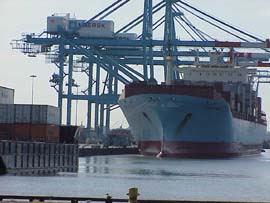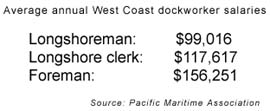|
West Coast port woes loom
|
 |
July 7, 1999: 1:38 p.m. ET
Dockworker discontent surfaces as contract talks break off
By Staff Writer Allen Wastler
|
NEW YORK (CNNfn) - There's trouble on the West Coast waterfront and U.S. businesses may have to take note.
A walkout at the Port of Oakland and a slowdown at the Los Angeles/Long Beach port complex continued Wednesday, according to port officials. The work actions started Tuesday after weekend contract talks between Pacific Coast dockworkers and waterfront employers were halted.
Officials at the Pacific Maritime Association, the management bargaining group, said Wednesday they had filed a complaint about the Oakland work action with the National Labor Relations Board.
Management issued a plea late Tuesday for the International Longshoremen's and Warehousemen's Union to return to the bargaining table. As of midday Wednesday, the union made no response.
"We believe we are still bargaining," said Phil Resch, senior vice president for the PMA.
Although West Coast ports are still functioning for the most part, the tense situation has businesses and companies that rely on Asia imports worried.
"When you look at the percentage of trade moving through the U.S. West Coast, it's pretty serious," said Mark Page, a senior consultant with Drewry Shipping Consultants in London. He said 84 percent of imports from Asia and 79 percent of U.S. exports to Asia move through West Coast ports.
"The trade is locked into the West Coast - alternatives are limited. Work actions are bound to have an impact," Page said.

What's off-loaded here ....
The three-year contract between the 9,500-member longshore union and the port companies expired July 1. The two sides agreed to continue business-as-usual while they continued to negotiate, according to a management statement.
However, Oakland dockworkers walked out Tuesday. In addition, longshoremen at Los Angeles/Long Beach, the nation's biggest port complex, began their slowdown, according to the Pacific Maritime Association, the management bargaining unit.
Work disruptions are particularly troublesome in the transportation business, in which customers gear inventory and sales schedules to regular deliveries. That, in turn, can mean lost sales and business for U.S. manufacturers and retailers.

... ends up here
"We're watching the negotiations day by day," said an executive with a major retailer, who asked not to be named because of the sensitive nature of the negotiations. "If labor problems go on for any length of time, it causes congestion in the ports and subsequent delays through the transportation chain."
Summer is the peak season for shipping on the West Coast, as manufacturers and retailers try to build up inventories in anticipation of a production push for the winter holidays.
"Any slowdowns or work stoppages are going to have repercussions," said Peter Gatti, director of policy for the National Industrial Transportation League, a lobby group representing U.S. companies on transportation issues.
"The situation is disappointing and of deep concern," said Don Wylie, managing director of maritime services at the Port of Long Beach. "We're moving into the peak season for freight and, knowing how fragile our system is, it is very important for everybody to be cooperating and working together."
The idea of "dependable" operations -- such as no work actions - has been one of the issues management has pushed in the current negotiations. It also wants to install new technology at ports to speed up cargo operations and turnaround.
New technology, however, traditionally has meant fewer workers on the waterfront. That raises union hackles. In the past, management has overcome union objections by allowing the longshore union to extend its jurisdiction over other areas of port work, such as maintenance and repair activities.
The ILWU represents workers at all ports along the West Coast. It also represents workers at various freight depots and cargo centers associated with the ports and hotel workers in Hawaii, bringing its total membership up to 42,000.
Labor cost is also an issue in the current negotiations. The union ended talks during the weekend after expressing disappointment with management's proposed increases in pension benefits for present and future retirees, according to management officials.
Management, however, thinks the union is already highly paid.

"With average 1998 annual salaries ranging from $99,016 for longshore workers, $117,617 for clerks, and $156,251 for foremen, the ILWU members are among the highest paid union members in the world," the PMA said in its statement.
PMA warned that an escalation of the work actions could have serious economic consequences. Citing a private study, the management group said a five-day work stoppage, for example, would cost the national economy $3.8 billion in lost work and revenue.
Officials at the ILWU were unavailable for comment. A recorded message at the union's headquarters in San Francisco, dated July 2, advised members that negotiations were continuing and that no action should be taken by members until they heard from the negotiating committee.
A variety of U.S. and overseas shipping companies plus local stevedores belong to the PMA. The main U.S. shipping lines involved in the negotiations include Sea-Land Service, a unit of CSX Corp. (CSX), and Matson Navigation Co., a unit of Alexander & Baldwin (ALEX). CSX fell 3/8 late Wednesday morning at 47-1/2. A&B slipped 1/8 at 23-11/16.
One ship at Oakland was worked Tuesday for humanitarian reasons, according to the PMA. The ILWU provided a crew to off-load a ship carrying cattle.
|
|
|
|
|
 |

|

